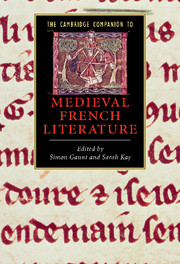Book contents
- Frontmatter
- Introduction
- Part I What is a Medieval French Text?
- 1 The Chanson de Roland
- 2 The Old French Vulgate cycle
- 3 Le Roman de la rose
- 4 The Testament of François Villon
- Part II What is a Medieval French Author?
- Part III What is the Value of Genre for Medieval French Literature?
- Part IV How can we read Medieval French Literature Historically?
- Appendix: Reference works for Old and Middle French
- Bibliography of medieval French texts
- Suggested Further Reading
- Index
- Series List
3 - Le Roman de la rose
from Part I - What is a Medieval French Text?
Published online by Cambridge University Press: 28 March 2009
- Frontmatter
- Introduction
- Part I What is a Medieval French Text?
- 1 The Chanson de Roland
- 2 The Old French Vulgate cycle
- 3 Le Roman de la rose
- 4 The Testament of François Villon
- Part II What is a Medieval French Author?
- Part III What is the Value of Genre for Medieval French Literature?
- Part IV How can we read Medieval French Literature Historically?
- Appendix: Reference works for Old and Middle French
- Bibliography of medieval French texts
- Suggested Further Reading
- Index
- Series List
Summary
There can be no doubt that the composite Roman de la rose, an allegorical love poem begun between 1225 and 1245 by an otherwise unknown court poet, Guillaume de Lorris, and completed between 1268 and 1285 by the scholastic author Jean de Meun, was the most admired, influential, and controversial literary work of the French Middle Ages. With nearly 300 extant manuscripts (several times the number for Chaucer’s Canterbury Tales), the Rose clearly enjoyed exceptional renown among medieval literate populations. The reason for this popularity may well be the poem’s encyclopaedic range of themes and styles and its openness to diverse interpretive approaches. Not only does Guillaume’s mannerly, euphemistic, and concise Rose stand in stark contrast to Jean’s ironic, explicit, and sprawling continuation, but also each of the two authors complicates the production of meaning in his poem by eschewing thematic unity, singular perspectives, and structural stability. Some medieval readers sought to straighten out these problems, emphasizing the passages they considered edifying or amusing, and minimizing or expurgating the rest. Others were evidently fascinated by the hermeneutical challenges posed by a hybrid text and sought to exaggerate its contradictions. Likewise, some modern scholars have claimed that the poem teaches Christian ethics by promoting sensuality ironically, others that it revels in moral indeterminacy and sexual liberation. Regardless of critical bent, most readers would agree with the early humanist Jean Gerson that the Rose contains a remarkably wide range of themes and styles and could 'rightly [be] called a formless chaos, a Babylonian confusion, and a German broth, like Proteus changing into all his shapes'. Indeed, even those scholars who insist on the poem’s orthodoxy acknowledge that it teaches its lessons through the juxtaposition of contradictory viewpoints and ironic reversals of meaning.
- Type
- Chapter
- Information
- The Cambridge Companion to Medieval French Literature , pp. 48 - 62Publisher: Cambridge University PressPrint publication year: 2008
- 1
- Cited by

